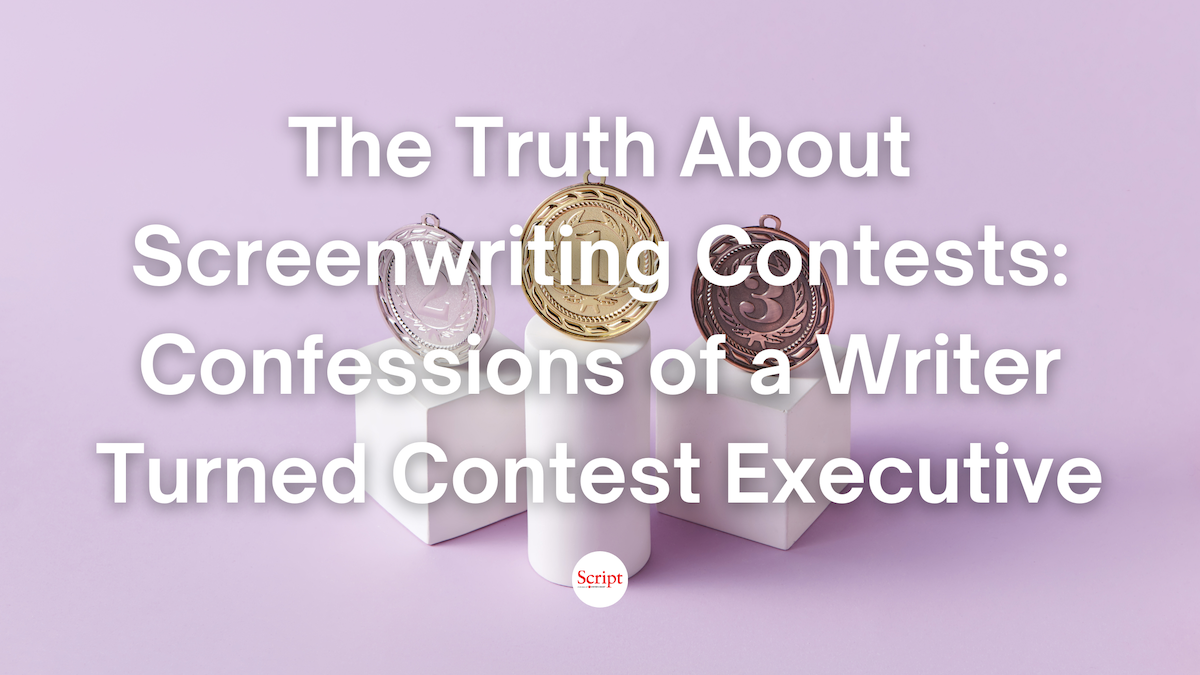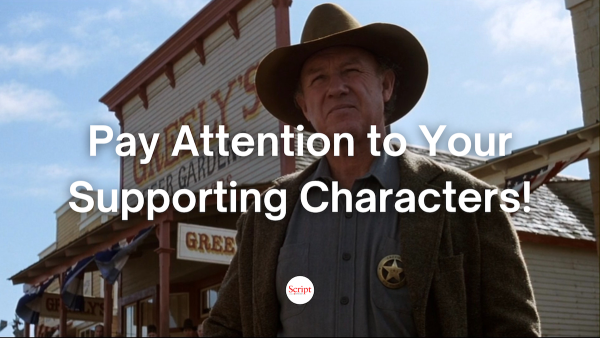BALLS OF STEEL™: Now What? – Using Therapy to Break Story
When your writing or your life stalls, stop dwelling in the pain and start pushing toward your goals by asking, “Now what?”
Jeanne Veillette Bowerman is the Editor of Script Magazine and a screenwriter, having written the narrative adaptation of the Pulitzer Prize-winning book, Slavery by Another Name, which was honored in the Top 25 Tracking Board Launch Pad Features Competition. Follow Jeanne on Twitter @jeannevb.
Fate. Do you believe in it? I do. Yesterday, I slammed the brakes on my insane life to interview story coach Patrick A. Horton, PhD about his book and upcoming event, Mastering the Power of Story. During that 2-hour conversation, Patrick said two simple words that changed my life… “Now what?”
Let’s rewind…
Patrick is not only a story coach, but in a previous life, he was also a therapist.
Ding, ding, ding!
My regular readers know how much I love equating crawling inside a character’s head to personal therapy. I’ve made a permanent indent in my own therapist’s couch.
Here’s a picture of my therapy file to prove it…
We spoke at length about how Patrick’s skills as a therapist help him in his story coaching. Just like gently peeling the layers off his patient’s wounds, Patrick approaches a struggling writer the same way. He digs deep until he gets down to the core of the problem… and it usually lies with the writer’s mind, not the story.
He’s developed a series of questions to help writers get to the root of their story problems:
- What do you think your story is about?
- How did that come to you and what about it will not let you go?
- Given your understanding of what the story is about, what about that matters to you?
- Given your understanding of that, what is it about this story that matters to your main character?(Chances are the answer to the last two will be the same or closely related)
- Given your understanding of the story at the moment, what is the transformation that is possible and needed?
- Given your understanding of the story at the moment, are you ready, willing, and able to go where the material needs you to go to sound its depths and find its arc?
Patrick explains, “It is rare that anyone can answer these quickly (and everyone wants to come up with quick intellectual answers that then run with it) and each time you loop them, every one of them is a new question as to how you understand and connect to the story.”
While you’re thinking of the answers to these questions, also consider Patrick’s storyteller’s three-part mantra:
• What matters matters.
• The issue is not the issue.
• Authenticity is everything.
Don’t worry if your mind is racing. I’ll be bringing Patrick’s wisdom to ScriptMag in upcoming podcasts, Conversations with a Coach. You can also read an excerpt from Patrick's book, Mastering the Power of Story.
Patrick worked extensively with therapy clients suffering from a major trauma or abuse, and made them feel safe. Think about it, writers are very similar. We all have war stories of producers pissing on our flame, or having us do rewrite after rewrite for no pay, only to dump our project when they can’t get funding. Is that “abuse”? Maybe not, but it certainly hurts like hell and is hard to recover from and learn to trust again.
Patrick rebuilds a writer’s trust.
As we discussed his process, he shared a technique he used in dealing with his most traumatized clients. He patiently listened. Just sat and listened, as the wounded birds poured their hearts out, sharing their tales of abuse, neglect, and even torture. At the end, as they were crying into their tissues, Patrick made them feel safe and congratulated them on how strong they were for surviving it. Validation.
Writers also need validation when they have rewritten a story to death, still unable to make it shine or find the heart of it. Despite our story not working, we need to be validated for our Herculean efforts in even putting pen to paper.
But even after validation, we’re still a mess, just like that wounded bird on Patrick’s couch.
Until the next question comes… “Now what?”
What do you mean “Now what?” I want to keep talking about my pain… wallowing in it… drowning in why my story won’t work… why my life is a mess… why I can’t heal. I’m not ready for “Now what?”
Guess what? You need to be ready for “Now what?” in order to move on with both your story and your life. Stop wallowing in the problem, the trauma, or the nightmare you endured. You survived it. Your story survived it… it may stink, but it’s still alive. Your life may stink, but you’re still alive. It survived. You survived.
Focus on “Now what?” What is it you want to achieve? Focus on that. Focus on the vision you have for your story and your career. Instead of dwelling on what is wrong with your story, focus on how to fix it.
Shut your trap and do the work. Man up. Stop being a wuss. Acknowledge the issues, digest them, give yourself permission to grieve the story you couldn’t tell, grieve the life you don't have, and then release it.
Most importantly, stop beating yourself up.
Read that again.
Stop. Beating. Yourself. Up.
It’s a story. There’s a reason you want to write it. Be brave enough to truly explore it in a way you never thought possible. Open your wounds and hand your audience a salt shaker.
Go there. It’s the only way to emotionally move your reader. If you can’t do that, no producer is going to sign on to your script. Sometimes the answer to your story’s problems are in your own heart. Take down your protective veneer and explore those emotions. Use them in your words. After all, isn’t that the reason we write? To move people? Think about the best stories you’ve ever read. I bet they all started with the author allowing herself to be raw and vulnerable.
My therapy file is pretty similar to some of my writing files – tear-stained, bulging with pain and vomit spewed on the page.
If I can fix the tortured, wounded bird inside of me, I can fix my stories.
Now what?
I get to work.
I’ll be taking next week off to do just that. Slavery by Another Name is calling yet again, despite the script feeling like slavery itself. Yes, I’m anxious to move onto my other projects, but if I want this one to have a chance with investors, I need to do the hard work necessary to make my producers confident.
Disclaimer: I'll still be tweeting and playing with our new ScriptMag Pinterest account. There are some addictions even a great therapist can't cure.
See you on the other side…
Related Articles:
- Balls of Steel: Focus, Focus, Focus
- Balls of Steel: Getting Honest Feedback
- Balls of Steel: Therapy for Your Character
Tools to Help:
Jeanne Veillette Bowerman is a Senior Executive at Pipeline Media Group and Book Pipeline, Editor-in-Chief of Pipeline Artists, Director of Symposium—a year-round conference in the arts, co-host "Reckless Creatives" podcast, partner at Fringe Press, former Editor-in-Chief of Script magazine and a former Senior Editor at Writer's Digest. Recognized as one of the "Top 10 Most Influential Screenwriting Bloggers," her "Balls of Steel" column was selected as recommended reading by Universal Writers Program. A compilation of her articles is now available at The Writers Store—Balls of Steel: The Screenwriter's Mindset. She is also Co-Founder and moderator of X's weekly screenwriters’ chat, #Scriptchat, and wrote the narrative adaptation of the Pulitzer Prize-winning book, Slavery by Another Name, with its author, Douglas A. Blackmon, former senior national correspondent of The Wall Street Journal. More information can be found on her website. X: @jeannevb | IG/Threads: @jeannevb_ | BlueSky: @jeannevb.bsky.social







